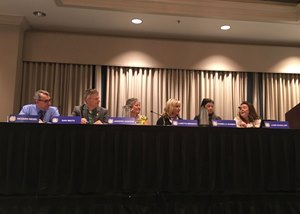Panel Discusses Sexual Harassment at Tracks


Members of a panel discussing sexual harassment issues at the National Horsemen's Benevolent and Protective Association convention March 16 in New Orleans said potential places for workers to turn include backstretch chaplains, horsemen's groups, backstretch health workers, and stewards.
Loretta Brennan, executive director of the Arkansas HBPA, applauded the move by the Illinois Thoroughbred Horsemen's Association to place forms in its office that allow workers to fill out a complaint about sexual harassment. Brennan acknowledged that not every worker may feel comfortable filling out such a form, but noted that it's important to have options and make workers aware of those options so they don't feel isolated.
Jennifer Johnson, vice president of Mountaineer HBPA who grew up on the backstretch, said workers need to have the ability to seek help and know where to turn.
"They do have to seek some help to make sure that behavior doesn't continue," Johnson said, noting that victims need to understand that they didn't do anything wrong, and by speaking up they can stop this behavior. "They have to understand they have rights."
The panel said sexual harassment can occur on the front side as well, and those workers should address the human resources department. They noted that where a worker can turn is not as well defined on the backstretch, and language barriers as well as the enclosed environment can potentially lead to feelings of isolation.
Brennan said that like every work environment, sexual harassment occurs on the backstretch. Some of those workers, who may not feel they are in a position of power, have shared their stories with Brennan.
"It definitely happens. I have had young women come to me in need and seek advice. I always reach out to my chaplain. I advise them that they can seek legal avenues. If it's serious enough, they can hire a lawyer, but that hasn't happened," Brennan said. "My chaplain goes and talks with them, and gets pretty stern with them. I don't think it's happened again once I've had that conversation."
Panel moderator Lynne Schuller recalled a personal incident where a horseman client she was representing at a hearing before the stewards said something highly offensive to her.
"I was going into a stewards meeting on a horseman, and he said something to me so shocking that I won't repeat it," Schuller said. "I remember thinking to myself, 'You idiot, you're going to say that to me right before a meeting. What would you say to an employee you hired mucking a stall?'"
Schuller said she informed the stewards of what was said, and they took some level of action against the horseman. She said it was never a problem again. But she said women working on the backstretch may not feel like they are in a position to say something. She said there have to be ways to communicate, and any victim has to feel comfortable in telling her story.
Richard Riedel, executive director of the Kentucky Racing Health and Welfare Fund, said horsemen and backstretch groups should start activities and events that are popular with women like yoga classes and self defense. He said as members become comfortable in that atmosphere, advocates can present on topics like sexual harassment and inform them of their options.
Dan Waits, executive director of Race Track Chaplaincy of America, said part of chaplaincy training now includes training on sexual harassment.
"While the horse racing environment is unique, this problem goes on in any environment. As employers and supervisors, we need to provide a safe environment. Some of this is not just about sexual advances, some is about control," Waits said. "People want to work in a safe environment where they are respected. It's that simple."
